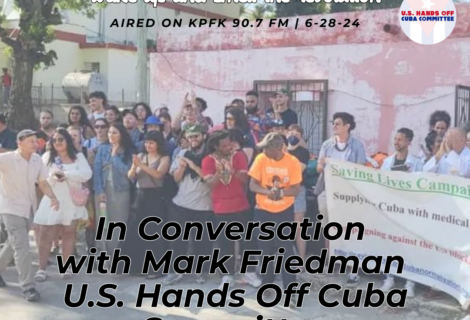Mumia Abu Jamal: On his biggest political influences and the political “mentacide” of today’s youth
Mumia Abu-Jamal is an American political prisoner currently serving a life sentence for an alleged murder of a Philadelphia police officer. Incarcerated since 1981, in a trial that was plagued with blatant judicial disregard, Mumia was originally sentenced to death and that was successfully appealed in 2011 and commuted to a life sentence. His efforts to get a new trial continue. Before his incarceration Mumia was a member of the Black Panther Party, radio journalist, served as president of Philadelphia Association of Black Journalists, and embraced black nationalism. Mumia has published several books which includes Death Blossoms: Reflections from a Prisoner of Conscience, All Things Censored, Live From Death Row, and We Want Freedom: A Life in the Black Panther Party. Despite being incarcerated Mumia is a very active movement builder and social commentator for many progressive causes, and he continues to fight for his complete freedom as a political prisoner.
Aired September 4, 2012
Click here to download.
Transcription: Mumia Abdul Jamal guests in Voices From the Frontlines
Hello everybody this is Eric Mann, you’re listening to Voices From the Frontlines on KPFK 90.7fm, 98.7fm in Santa Barbara.
Eric (E): We’re really honored to have this interview with Mumia Abdul Jamal. I don’t think we need much of an introduction but a true modern day hero and Mumia it’s really nice to have you on the show.
Mumia (M): Hey, what’s going on!
E: Well we have 15 minutes, I was told… so let’s start with philosophy. I saw your terrific interview on Russian television or heard it; you were mentioning Gramsci and the ideas about hegemony. Do you read Du Bois, who else do you read? Who are the main philosophical writes you think that have influenced you the most?
M: Well, I read as widely as I can; that is the books they allow in here, I tend to study/think about. Du Bois is certainly a part of it because, you know, who can study Black history without studying W.E.B. Du
Bois? The souls of Black folk is a poetic, lyrical, beautiful, wonderful, page of history but also a wonderful
piece of culture and I think the [interrupted by prison monitor] only work of Du Bois that really hits me
harder and deeper is actually his lesson on word known as Darkwater. Because it’s the mature Du
Bois, I mean the Souls of Black Folk was his kind of coming out party you know, and when you read
Darkwater you see that he is writing really the pogroms and the racial violence waged against Black
people all throughout the country during the 19teens and it’s another Du Bois. I mean he’s darker, he’s
bolder, he’s angrier, he’s grittier, and it’s just a remarkable public intellectual and radical and eventually a
revolutionary; giving his thoughts on what is happening in the world at that time.
E: You know to read the intellectual biographies and to see a 90+ year life and to see the constant
evolution of his thinking to actually die on a day of the march on Washington and to advocate
Communism; I read a quote by King who said, “Let’s get right to the point that because Du Bois was a
Communist, they are trying to wipe him out of the historical record.”
M: Right. Well, in many ways he has been, I mean if you think about many of his contemporaries at that
time, for example, Paul Robeson. I mean who knows who Paul Robeson is? If you’re African American
historian or you study African American studies of history, you may be familiar with him. But you know
there was a time that he was literally the most famous man, if not the most famous Black man in the
world. There were streets and universities and mountains named after him, throughout much of the third
world. He was treated like a prince when he went to Soviet Union but of course his passport, like Du Bois,
his passport was ceased by the U.S. government. For years he couldn’t travel but that’s lost history in
many ways and today millions of Black people who he fought for and working people who he worked with
and fought for, don’t even remember his name. So, you know the disappearance act is very powerful in
the United States of America.
E: Well you know, I know a lot about Du Bois and Robeson; I’ve read all of their biographies. Robeson
was of course almost super human in terms of all American football player, spoke 40-50 languages,
greatest singer; I think one of the things that’s really important [Mumia: “and lawyer don’t forget!”] that’s
right! and lawyer…and playwright and actor. But one of the things that’s missing today that scares me,
I mean I come out of the 60’s, I’m a product of Black liberation, culture, intellectual thought that I think
to see young people today that is really being lost, including even the history of the 60’s and the Black
Liberation Movement let alone Du Bois’ and Robeson’s We Cry Genocide. What can we do?
M: This is what a famous Black psychologists called Mentecide; that is the suppression of the mind. A
few weeks ago, I saw (ironically) a well known, very erudite Black historian and scholar, Nell Irvin Painter.
Studies have shown, [interruption] excuse me, studies have shown [interruption]
E: These people are kind of rude don’t you think?
M: Quite rude!
E: No kidding! We’re having an interview here, they have no respect..
M: None whatsoever
E: Go ahead..
M: Dr. Painter said, when she’s speaking to her audience in Harlem at the Harlem Book Fair, the more
children, Black children specifically, Latino children but the more Black children watch popular culture,
the more damage it does. That is to say it creates a kind of mentacide, it destroys their consciousness, it
does damage to their self-esteem, and how they look at themselves and how they see themselves in the
world. Now I happen to think that the intention of popular culture, you know this mercantilist, you know
shop everyday emptiness that we see in reality TV everyday. I think it’s true as well but one of the worst
things it’s done is it has obliterated African American culture in the minds of African American children so
that they do not know their history from which they come; that’s a kind of historical genocide as well.
E: We at the Strategy Center are trying in our very small way to rebuild Black political thought as a
frame not just for African American people but it’s been in fact the best frame that was created for
understanding this country, for understanding imperialism; f you look at the 60’s, every single person,
Latino, Asian, Indigenous people, Whites were totally shaped by Black political thought.
M: That’s a fact. That is an absolute fact, not kind of a theoretical construct; I say that because being part
the Black Liberation Movement and other similar type movements over an extended period of time. When
I meet someone who is White anti-imperialist, activist and resistant, I invariably ask them what turned
them off, what he met, or book, or person, or personality or voice, movement to the movement. Among
people of my age and slightly older, Dr. Allen Bergman and his wife, David Gilbert a lot of the people let’s
say of the SDS and Weathermen Generation, they always say they were living in New York and they
heard Malcolm speak and the world was different. The day they heard him speak, like David Gilbert went
to Columbia and he gave a speech and a week later Malcolm was gone. But it stuck with him his entire
life. It transformed his consciousness; it opened up doors of perception that he didn’t know existed. It told
him the truth about American history and to extension African American history. The great stories that
have been submerged in the mud, in the blood of the American imperial story; and it transformed him.
E: The thing about Malcolm is, I think he’s really raised the level of verbal oratory, to a whole new art form
that is the most advance; I mean reading his speeches and of course hearing his speeches, it’s as you
said, I mean it’s almost in another stratosphere.
M: And to talk about popular culture and Malcolm for a moment, we are both of the same generation I
take it-
E: Yes
M: -and I remember growing up and literally on the Black radio stations and the college stations in my
town Philadelphia, would play the whole side, or both sides of Malcolm X speaking many of his great
speeches; you could hear that on the radio, imagine what that’d do to kids! When I was 15 or 14 or
something, and you know it was like cracking my mind, like a walnut, just pouring this energy into it.
Imagine to what kids are listening to today and how remote it is from their daily existence, I mean I
understand, I don’t want to sound like a, shall we say like an old geezer complaining about “You know
back in the good old days..” but imagine what kids are hearing on hip-hop radio everyday. But that don’t
mean the beat, because the beat is pretty tasty, and really pretty exciting. I’m talking about, what are
they rapping about. And if you hear most of these cats, they’re talking about: how many cars they got, if
you excuse my French, how many bitches they got, how many gold chains they have around their neck;
it’s about stuff, it’s about material, it’s about wealth, it’s about fame, it isn’t about an idea, it isn’t even
about what’s in their heart, it ain’t even what’s in their minds. It’s a kind of cultural post that’s as empty as
popcorn, you dig?
E: Yes I dig.
M: And to imagine the generation- [interrupted by prison telephone monitor]
E: Yeah, I just want to end because I’m worried we’ll get cut off. I see you of course in that we’ve talked
about Du Bois, we’ve talked about Robeson, but of course you are the present embodiment of that
philosophy ad that lineage, do you consciously see yourself playing that role? Because you are.
M: Well, I don’t only in this sense, they are as much a part of me as my mother, my father, my family
because eventhough I never had the pleasure of meeting Malcolm, you know, I remember being
invited when he came to Philadelphia when I was a kid, I kind of sneered at the idea at it, you n=know,
and eventhough I lived in Philadelphia during the last years of Robeson, wow! I read his book, here I
stand and it gave me chills. And this is a book about him testifying before Congress and giving hell to
segregation a racist Congressman, it never dawned to him that, until it was too late that he lived in West
Philadelphia, I could’ve gone on a bus and walked up to his door, knocked on it and beg my way in just
to say “Thank you man” and say “I just read your book, I love you, you’re one of the greatest, you’re my
hero.” But they became part of me and of course to be part of a movement and to be part of a movement
that was headed by Dr. Huey P. Newton, and had Eldridge, all those good brothers and sisters of the
Black Panther Party. They’re a part of me, so they’ve enriched my life, expanded my consciousness,
opened up my perception of what the world could be and should be. If people work together, and do what
you call transformative organizing, it will be better, a richer, and a sweeter world.
E: Boy, that was very nice to say, so you did get the book huh?
M: Hahahaha-
E: Hahahaha
M: I did indeed, I read the intro but I’m working on my own book, so I’m a little –
E: Well that’s more of a priority, that’s more of a priority. I just want say that one the goals I think that
movement should do is to get you on the radio more, and more, and more and we’d love to have you, you
know, you have a lot of other obligations but-
M: Well Eric let’s do this again.
E: That’d be great Mumia, we really like it a lot and thanks so much for all you’re doing for everybody.
M: Thank you, on the move, long live John Afrika, long live the people’s movement for freedom, justice
and equality.
ever met; and just listening to him, you know we did the interview 2 week s ago so, I’ve never heard it
before and I was busy being in it but just obviously you don’t need an interpretation but the precision of
his thinking, the sedateness of where his mind is going, the role of Black public intellectuals is so critical,
and the rebuilding of Black revolutionary thought so, he’s such an original thinker. One of things that
Geoff Ramsey Ray, the producer, and I are trying to figure out how to get him on the show pretty often.
He also does these 2 minute commentaries that we would like to get more often on this show; he does
news analysis and stuff. So, let’s try to make that happen, I want to know that there are people still trying
to figure out how to get him out of prison that is to say, I think you know that thank goodness they’ve
dropped the death penalty, his present sense is life in prison without the possibility of parole, he’s in a
general population which is terrific. He has human contact but the Free Mumia Movement is not over and
in future shows, I don’t know enough about the specific legal grounds and human rights grounds they’re
bringing it. But there will be, I just want to be clear our continued effort to free Mumia Abdul Jamal. So, I’m
sort of sitting here, genuinely speechless and just listening to his voice. This is the end of this show, as
always I want to thank you for listening to Voices From the Frontlines, this has been your host Eric Mann.
Hosted by Eric Mann on KPFK 90.7 FM







Trackbacks for this post